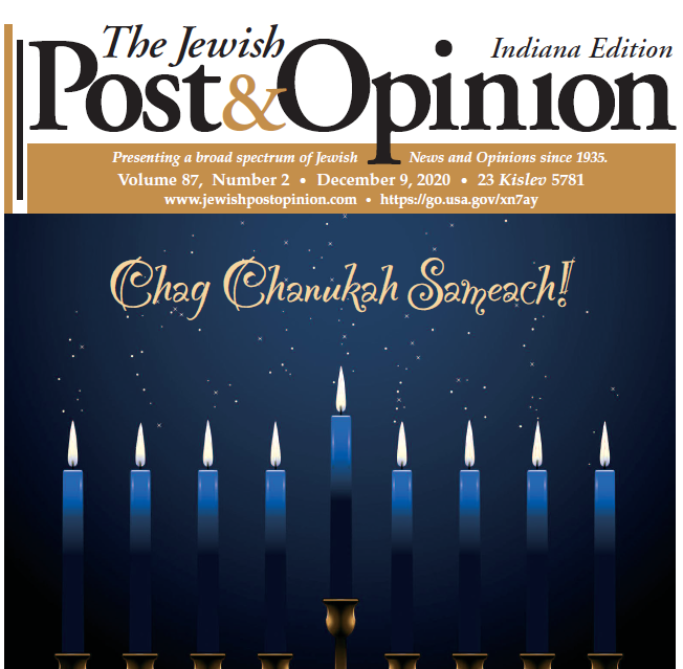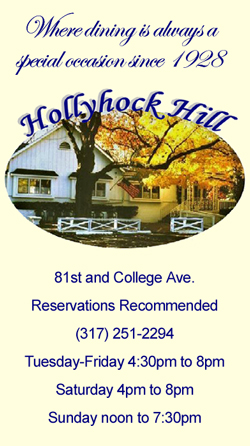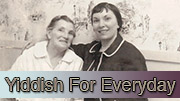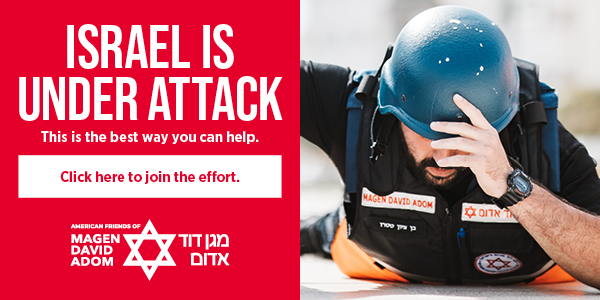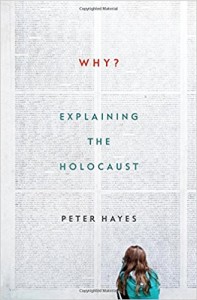
Why? Explaining the Holocaust by Peter Hayes
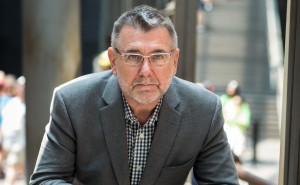
Peter Hayes at the United States Holocaust Memorial Museum. Credit: Miriam Lambskin for USHMM; used with the author’s permission.
Holocaust Educator
By Dr. Miriam L. Zimmerman
Spouses of Holocaust educators are accustomed to schlepping to Holocaust programs and organizations throughout the year. This was to be my weekend, proclaimed my husband, Richard, in advance. Thus, I got to call the shots at my 50th college reunion at Northwestern University (NU) in Evanston, Ill. First stop? The Holocaust Educational Foundation (HEF), coincidentally located just across the street from the quad where I had lived during my senior year, 1966–67.
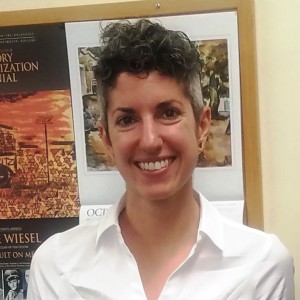
HEF Assistant Director Alexandra “Alex” Israel
Assistant Director Alexandra “Alex” Israel courteously gave me her undivided attention and answered all my questions. Richard said he was comfortable reading his book in the hallway, sipping a fresh cup of coffee, thanks to Alex.
Mauthausen survivor Theodore Zev Weiss, his wife Alice R. Weiss, and other Holocaust survivors founded HEF in 1976. Mr. Weiss was evacuated from Mauthausen in late April 1945 to one of its sub-camps, Gunskirchen. American forces liberated him on May 4, 1945.
I cannot think of Mauthausen without remembering George Heller, z”l, also a Mauthausen survivor, who yearly spoke to my Holocaust students at Notre Dame de Namur University (NDNU). His inspiring story about surviving two weeks without food and almost no water above the stone quarry at Mauthausen was like a TED talk, before TED talks became a cultural phenomenon. Students have told me that Mr. Heller’s story changed their lives.
HEF has as its mission to advance teaching and research about the Holocaust at the university level, according to Alex. It does so by various venues, including a biennial academic “Lessons and Legacies” Conference, an annual Theodore Zev Weiss Lecture, and a Summer Institute to help “teachers and graduate students gain a background in Holocaust studies in preparation for teaching courses on the Holocaust at their home institutions.” The Summer Institute consists of “intensive seminars on Holocaust studies and related topics, conducted by some of the field’s top experts,” according to the HEF website, and occurs on the Evanston campus and at Royal Holloway, University of London.
Alex explained that HEF became part of Northwestern in July 2013. Last year, it moved from The Graduate School to NU’s Weinberg College of Arts and Sciences (undergraduate), a better fit. The next Lessons and Legacies Conference will be at Washington University in St. Louis, Nov. 1–4, 2018. The Call for Papers is now available. For the application and more information, consult the website, http://www.hef.northwestern.edu/lessons-and-legacies-conference/lessons-and-legacies-2016/.
HEF also endows a professorship in Holocaust Studies. Peter Hayes is a retired professor of history and German at NU and the Theodore Zev Weiss Holocaust Educational Foundation Professor of Holocaust Studies Emeritus. The award-winning scholar and researcher chairs the Academic Committee of the United States Holocaust Memorial Museum. His newly published book, Why? Explaining the Holocaust, was just released in German.
In advance, I asked Professor Hayes if I could interview him during the upcoming homecoming weekend, Oct. 6–8, 2017. Email exchanges revealed that he would be leaving for a speaking tour in Germany just before the weekend. Professor Hayes graciously suggested a telephone interview instead.
My first question had nothing to do with Dr. Hayes’ new book, but with his colleague, associate professor of electrical engineering, Arthur R. Butz. Butz authored The Hoax of the Twentieth Century: The Case against the Presumed Extermination of European Jewry. This book by a tenured Northwestern University professor has served the Holocaust denial movement since its 1976 publication. As a NU alum, I have felt personally embarrassed by having such a man at Northwestern.
I asked Dr. Hayes if he had ever been on a committee with Butz or had to work with him in an institutional endeavor. My typed notes paraphrased Dr. Hayes’ response: “I never actually exchanged words with him; I have been in the same room with him. For example, Saul Friedländer gave a lecture at NU with Butz in the audience. He asked a question which Friedländer declined to answer. There was an overlap when we were in NU’s gym at the same time. Afterward [in the men’s locker room], we stood in front of the mirror, side by side, shaving.” Neither man spoke.
I asked what motivated Dr. Hayes to make the Holocaust his professional focus, and, since I teach in a Roman Catholic university, if his Roman Catholic upbringing had anything to do with it. He replied that he lived in a suburb outside of Boston; many Jews lived in his part of town. It made the presence of antisemitism puzzling for him. “All my best friends were Jews. I went to more Bar Mitzvahs than [Catholic] confirmations.”
His interest in the Holocaust happened gradually. He explained that he grew up in the ‘60s; saw little girls blown up in churches, police dogs attacking Blacks. Racial violence and the Vietnam War “raised the issue of how my country – people could be very destructive.”
His sister married a man born in Germany under the Third Reich, who had emigrated to the U.S. after World War II at the age of five. Subsequently, Professor Hayes lived with his brother-in-law’s father in Dusseldorf, where he went to work in a steel factory. While sorting steel pipes in the delivery hall, he learned German. He explained that he found the German language very challenging because he had never studied Latin and thus had to wrestle with complicated case endings. (I resisted the impulse to share with him that my high school Latin helped me understand grammar, but it did nothing to help me learn German. This interview was about him, not about me.)
“Language was a big factor,” he continued, in his becoming a Holocaust scholar – being able to read and write in German. “I am interested in racial violence, interested in how people become violent for the sake of largely fictional ethnic qualities,” the good professor concluded.
He graduated from Bowdoin College in 1968, received a Keasbey Scholarship to study at Balliol College, Oxford, and turned 22 that September. He went over on the boat with the Rhodes Scholars a month later, meeting Bill Clinton en route. Clinton “was at a different college (university), and I didn’t belong to his inner circle, but we were friends. We then met up again during his final year at Yale Law School, which was my first year of graduate school.” The then Mr. Hayes worked for a few years after Oxford and before going to Yale to earn his Ph.D.
“My Ph.D. thesis was a study of IG Farben, the largest corporation in Germany, and its relations with the Nazi State. That dissertation turned into my first book.” His NU Curriculum Vitae notes that his book, Industry and Ideology: IG Farben in the Nazi Era, Cambridge University Press, 1987, won the Biennial Book Prize of the Conference Group for Central European History of the American Historical Association in 1988.
Recently retired (2016), Professor Hayes taught at NU for 36 years. “I’m not retired enough,” he quipped. He is “still writing a lot, consulting with museums and exhibitions.” His current speaking tour in Germany will last for 17 days; he will return to the U.S. for a week, and then back to Germany.
I am always looking for new books to update my required texts for my Holocaust class. On page XIV of his Introduction to Why? Explaining the Holocaust, Dr. Hayes described how the text accreted from years of student interaction and audience questions after his many lectures on the Holocaust. He did not use a thesis to structure his book, but had as his goal, to answer commonly asked questions about the Holocaust.
After “many years of teaching and public speaking, during which I learned which aspects of the subject people most want clarified and why,” the researcher identified “the most reliable responses that scholarship can offer, and then honed ways to make that knowledge as accessible and memorable” as he could.
The book is divided into eight chapters, each of which answers a unique “why” question, such as, “Why the Jews?” “Why the Germans?” “Why Murder?” etc. Each chapter is divided into two parts, except Chapter 4, which has three parts. The text is detailed, compact, thorough, and clear.
I told Dr. Hayes how much I admired his ability to document his assertions with numbers; very persuasive. He said his “objective was to do this,” modestly adding that he “didn’t quite succeed as compactly as possible. Less is more.” He did not want “to overwhelm the reader with detail. Each chapter is 40 pages, two parts of 20 pages each.” His goal was that “every piece [should have] coherency, clarity, and concision.” Despite his modesty, I believe he succeeded.
A secondary goal was “to set the record straight.” Throughout the book, Dr. Hayes debunked common myths that have shrouded the topic, including, in his last chapter, the biggest myth of all: that the Holocaust never happened. I wondered if Professor Butz read that chapter.
The first such myth I encountered was in Chapter 3 “Escalation: Why Murder?” On page 122, In his discussion of IBM, the author stated that “…IBM’s rebellious subsidiary, the Deutsche Hollerith Maschinen Gesellschaft, managed by the spiteful German who formerly owned it, did not play the roles in identifying and later rounding up the German Jews or in managing slave labor that the parent firm’s critics have maintained.” The Hollerith machine, named for its inventor, was a precursor to the computer, but stored data on punched cards.
I asked Dr. Hayes to clarify. He stated that the Hollerith machine was not used in the 1933 census; it did not play a pivotal role in the collection of data. The historian explained that the results of the 1939 census were not completely counted until 1942. The Nazis had multiple other sources of data on the Jews. The Hollerith machines were not necessary to identify and segregate them.
He cited roundups in Poland as an example, where the Nazis used intimidation and terror. “If you don’t assemble into the ghetto by such and such a date, you will be killed.” Most Jews chose to comply. Hollerith machines were not needed for subsequent roundups of the Jews. “The Hollerith machine was not essential to moving German railways,” he added.
“The role of U.S businesses in the Holocaust is overblown; U.S. business was not important enough in the increasing power of the Third Reich. Standard Oil had deals with IG Farben, but were not central to the military of Nazi Germany,” Dr. Hayes explained. He concluded, “The Hollerith machine is a legend.”
I ruefully confided in him that I am guilty of perpetrating the legend, relying on other scholarship that indicates the opposite. I felt that my professional integrity was at stake here. He kindly pointed out that he keeps learning new things, refining his own teaching.
Instantly, I acquired more empathy for my students, who are currently beginning their research projects. Many feel overwhelmed by the vast array of sources on the Holocaust that the Internet makes available to them. If their instructor does not always correctly evaluate sources, how can she expect her students to do so?
It is my students who drive my ultimate decision as to whether or not I adopt a text for the class. As of this writing, I have not decided. The level of detail and documentation of this text that I find so compelling, might detract beginning students of the Holocaust. Since NDNU became a designated Hispanic-serving university several years ago, most of my students are Catholic. Many have no prior knowledge of the Holocaust, save for clichés about the Jews and perhaps having read The Diary of Anne Frank. I decided to assign individual chapters to students later this semester for their oral reports to obtain their feedback on the text.
Professor Hayes’ NU bio describes his current endeavor, working on a book, with Stephan Lindner of Munich, titled, Profits and Persecution: German Big Business in the Third Reich, which is under contract in English with Cambridge University Press and in German with Beck Verlag. I look forward to writing about this book.
Back on the Evanston campus, Richard parked our rental car in front of Hillel at Northwestern. A Holocaust foundation and a visible Hillel at NU? How far the University has come in 50 years! When I matriculated at NU, Jews were scarce and subject to an entrance quota. Scandal my freshman year: on admissions tracking forms, Jewish applicants were underlined and Blacks were circled. Maybe it was the other way around.
I regret tossing out my Daily Northwesterns (student newspaper) from that year, 1963–64, whose Jewish student editor broke the story. The director of NU’s Admissions Office at the time, C. William Reilly, threatened to revoke the editor’s scholarship. The editor promptly published that story. The unfolding of the scandal in a series of articles resulted in the resignation of Mr. Reilly and presumably, more equitable admissions practices.
These thoughts percolated through my mind as Richard and I boarded a shuttle to Ryan Field where Penn State’s Nittany Lions would devour the NU Wildcats. Scoreless until the end of the fourth quarter, NU’s only touchdown felt like a win. Fifty years ago, after opponents’ repeated scores, NU cheerleaders chanted, “That’s all right; that’s OK. You’ll be working for us someday.”
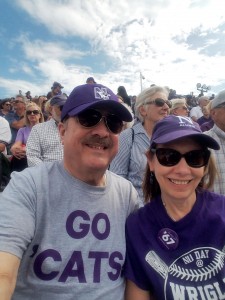
A selfie of the author and her husband seated among alums who now qualify to be in the “Half-Century Club” at NU.
One of my last questions for Dr. Hayes was what would he like readers to know about Why? There are two big takeaways, he declared. First, “the Holocaust can be explained as well or as poorly as any [other] human event. To say that it is unfathomable is an emotional, moral reflex.”
“The other takeaway is to beware of the beginnings. It can snowball if you don’t nip it in the bud. If people with terrible ideas achieve power, they draw more and more people to their side. Fight back early.” The last sentence of his book underscores this admonition: “Beware the beginnings.”
I asked if he were referring to Trump. Was the U.S. “at a beginning?” Dr. Hayes pointed out that he “finished writing the book in Jan. 2016. [I] didn’t see Trump coming. Like a lot of Americans, [I] thought it was impossible. He won by the skin of his teeth; he’s a minority president, the second we’ve had in the last 20 years. He got 100,000 votes in the right places. I did not write the book with a presidential agenda beyond what I always teach: politics matter.
“[People] always have to be thinking about their individual actions’ impact on national politics. In the abstract, that is what I was trying to say, but now people see the relevance. The two most common words in reviews are ‘timely’ and ‘topical.’ The mobilization of political anger to achieve selfish ends….”
I could not type fast enough to keep up. I heard his alarms going off over the phone, similar to my husband’s annoying computer tones that remind him of his next engagement. We had been talking for more than 40 minutes, longer than I had requested. I thanked him, wished him luck on his speaking tour, and refrained from informing him that my daughter and her family had just moved to Munich permanently.
My takeaway: With a genocide of this magnitude, there may never be an end to asking the question “Why?” but there is a moral necessity to keep asking it. We cannot give up this pursuit by capitulating to “this is too horrible to fathom.” We must continue searching for answers. The search itself motivates us to seek alternatives to hatred, racism, misogyny, and xenophobia.
Based on one man’s lifetime of research, public speaking, and teaching, Why? Explaining the Holocaust provides answers to those questions that most people have about the Holocaust, including people who might not have the ability to articulate such questions. With this insight, I strongly recommend this book to anyone who wants to learn more about the complexity of the Holocaust. I will require parts, if not all, of this book to my next Holocaust class. As more of us find answers, there will be more of us to ensure that never again will prejudice, hatred and tyranny triumph.
Dr. Zimmerman is professor emerita at Notre Dame de Namur University (NDNU) in Belmont, Calif., where she continues to teach the Holocaust course. She can be reached at mzimmerman@ndnu.edu.
